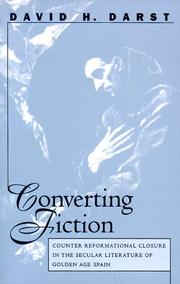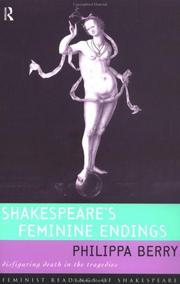| Listing 1 - 10 of 10 |
Sort by
|
Book
Year: 1990 Publisher: [Place of publication not identified] Princeton University Press
Abstract | Keywords | Export | Availability | Bookmark
 Loading...
Loading...Choose an application
- Reference Manager
- EndNote
- RefWorks (Direct export to RefWorks)
Epistolary fiction, French --- French prose literature --- Narration (Rhetoric) --- Closure (Rhetoric) --- History and criticism
Book
Year: 1991 Publisher: [Place of publication not identified] Princeton University Press
Abstract | Keywords | Export | Availability | Bookmark
 Loading...
Loading...Choose an application
- Reference Manager
- EndNote
- RefWorks (Direct export to RefWorks)
Historical drama, English --- Literature and history --- Kings and rulers in literature --- Contradiction in literature --- Closure (Rhetoric) --- History and criticism --- Shakespeare, William, --- Histories. --- Great Britain --- History --- Historiography. --- In literature.
Book
ISSN: 09280731 ISBN: 9789004218222 9789004221307 9004221301 1283395940 9786613395948 900421822X Year: 2012 Volume: 111 Publisher: Leiden: Brill,
Abstract | Keywords | Export | Availability | Bookmark
 Loading...
Loading...Choose an application
- Reference Manager
- EndNote
- RefWorks (Direct export to RefWorks)
There has been much discussion of narrative aspects of the Bible in recent years, but the ends of biblical narratives – how the ends contribute to closure for their stories and how the ending strategies affect the whole narrative – have not been studied comprehensively. This study shows how the writers and editors of short narratives in Genesis gave their stories a sense of closure (or in a few cases, the sense of non-closure). Multiple and sometimes unexpected, forms of closure are identified; together these form a set of closural conventions. This contribution to narrative poetics of the Hebrew Bible in the light of source criticism will also be valuable to those who are interested in narrative and in concepts of closure.
Closure (Rhetoric) in the Bible. --- Bible. --- Criticism, Narrative. --- 221.015 --- Oud Testament: literaire kritiek; authenticiteit; bronnenstudie; Formgeschiche; Traditionsgeschichte; Redaktionsgeschichte --- Be-reshit (Book of the Old Testament) --- Bereshit (Book of the Old Testament) --- Bytie (Book of the Old Testament) --- Chʻangsegi (Book of the Old Testament) --- Genesis (Book of the Old Testament) --- Sifr al-Takwīn --- Takwīn (Book of the Old Testament) --- 221.015 Oud Testament: literaire kritiek; authenticiteit; bronnenstudie; Formgeschiche; Traditionsgeschichte; Redaktionsgeschichte --- Closure (Rhetoric) in the Bible

ISBN: 019508344X 9780195083446 1602566240 9781602566248 9780195344776 0195344774 1423734769 9781423734765 1280443553 0197705413 Year: 1996 Publisher: New York (N.Y.): Oxford university press,
Abstract | Keywords | Export | Availability | Bookmark
 Loading...
Loading...Choose an application
- Reference Manager
- EndNote
- RefWorks (Direct export to RefWorks)
This work argues that artificial endings in Euripides reinforce innovations in plot and ending. After exploring the playwright's novel closing gestures, the book offers readings of plot, ending and generic innovation in six of Euripides' plays.
Tragedy --- Mythology, Greek, in literature --- Closure (Rhetoric) --- Originality (Aesthetics) --- Rhetoric, Ancient --- Euripides --- Technique --- Mythology, Greek, in literature. --- Originality (Aesthetics). --- Closure (Rhetoric). --- Rhetoric, Ancient. --- Tragedy. --- Technique. --- Ancient rhetoric --- Antieke retoriek --- Conclusion (Rhétorique) --- Endings (Rhetoric) --- Last lines (Rhetoric) --- Oorspronkelijkheid (Esthetica) --- Originaliteit (Esthetica) --- Originalité (Esthétique) --- Peroratie --- Peroration --- Péroration --- Retoriek [Antieke ] --- Retoriek van de Oudheid --- Rhetoric [Ancient ] --- Rhétorique ancienne --- Rhétorique de l'Antiquité --- Slot (Retoriek) --- Drama --- Classical languages --- Greek language --- Greek rhetoric --- Latin language --- Latin rhetoric --- Aesthetics --- Rhetoric --- -Technique --- Ėvripid --- Yūrībīdīs --- Euripide --- Euripedes --- Eŭripido --- Eurypides --- Euripidesu --- אוריפידס --- エウリーピデース --- Εὐριπίδης --- Criticism and interpretation --- Greek drama (Tragedy) --- History and criticism --- Euripides - Technique --- History and criticism. --- Criticism and interpretation.
Book
ISBN: 0813021944 9780813021942 Year: 1998 Publisher: Gainesville University Press of Florida
Abstract | Keywords | Export | Availability | Bookmark
 Loading...
Loading...Choose an application
- Reference Manager
- EndNote
- RefWorks (Direct export to RefWorks)
Discourse analysis, Literary. --- Rhetoric, Medieval. --- Closure (Rhetoric) --- Discourse analysis, Literary --- Rhetoric, Medieval --- English --- Languages & Literatures --- English Literature --- Literary discourse analysis --- Rhetoric --- Literary style --- Endings (Rhetoric) --- Last lines (Rhetoric) --- Peroration --- Chaucer, Geoffrey, --- Chaucer, Jeffrey, --- Chʻiao-sou, Chieh-fu-lei, --- Chieh-fu-lei Chʻiao-sou, --- Choser, Dzheffri, --- Choser, Zheoffreĭ, --- Cosvr, Jvoffrvi, --- Tishūsar, Zhiyūfrī, --- Technique.

ISBN: 1469641658 9781469641652 9780807892633 0807892637 Year: 1998 Volume: 259 Publisher: Chapel Hill: University of North Carolina press,
Abstract | Keywords | Export | Availability | Bookmark
 Loading...
Loading...Choose an application
- Reference Manager
- EndNote
- RefWorks (Direct export to RefWorks)
Closure (Rhetoric) --- Conversion in literature. --- Counter-Reformation --- Religion and literature --- Spanish literature --- Endings (Rhetoric) --- Last lines (Rhetoric) --- Peroration --- Rhetoric --- Anti-Reformation --- Church history --- Church renewal --- Reformation --- Literature --- Literature and religion --- History and criticism. --- Moral and religious aspects --- Conversion in literature --- History and criticism --- Spanish literature - Classical period, 1500-1700 - History and criticism --- Religion and literature - Spain --- Counter-Reformation - Spain

ISBN: 0813558212 0585333181 9780585333182 0813528305 0813528291 9780813558219 Year: 2000 Publisher: New Brunswick London Rutgers University Press
Abstract | Keywords | Export | Availability | Bookmark
 Loading...
Loading...Choose an application
- Reference Manager
- EndNote
- RefWorks (Direct export to RefWorks)
American fiction --- Historical fiction, American --- Literature and history --- Western stories --- Frontier and pioneer life in literature. --- Wilderness areas in literature. --- Naturalism in literature. --- Closure (Rhetoric) --- Endings (Rhetoric) --- Last lines (Rhetoric) --- Peroration --- Rhetoric --- History and literature --- History and poetry --- Poetry and history --- History --- History and criticism. --- History. --- West (U.S.) --- In literature. --- 20th century --- History and criticism --- West [U.S.] in literature --- 19th century --- Historical fiction [American ] --- Naturalism in literature --- Boone, Daniel --- Norris, Frank --- Criticism and interpretation --- Crane, Stephen --- London, Jack --- Cather, Willa Sibert --- Curtis, Edward S.
Book
ISBN: 0813021294 9780813021294 Year: 1995 Publisher: Gainesville : University Press of Florida,
Abstract | Keywords | Export | Availability | Bookmark
 Loading...
Loading...Choose an application
- Reference Manager
- EndNote
- RefWorks (Direct export to RefWorks)
English poetry --- Manuscripts, English (Middle) --- Rhetoric, Medieval. --- Closure (Rhetoric) --- Arthurian romances --- Knights and knighthood in literature --- Rhetoric, Medieval --- English --- Languages & Literatures --- English Literature --- Romances --- English manuscripts (Middle) --- Manuscripts, Middle English --- Middle English manuscripts --- English literature --- Endings (Rhetoric) --- Last lines (Rhetoric) --- Peroration --- Rhetoric --- History and criticism. --- History and criticism --- Gawain and the Grene Knight. --- Pearl (Middle English poem) --- Gawain and the Grene Knight --- Sir Gawain and the Grene Knight --- Sir Gawayne and the Grene Knight --- Gawayne and the Grene Knight --- Sir Gawain and the Green Knight. --- Arthurian romances. --- Knights and knighthood in literature.

ISBN: 1134914946 1280328835 0203313550 0203072847 9786610328833 9780203313558 9780203072844 9781134914944 6610328838 0415068940 9780415068949 0415068959 9780415068956 9781134914890 9781134914937 1134914938 Year: 1999 Publisher: London ; New York : Routledge,
Abstract | Keywords | Export | Availability | Bookmark
 Loading...
Loading...Choose an application
- Reference Manager
- EndNote
- RefWorks (Direct export to RefWorks)
Philippa Berry draws on feminist theory, postmodern thought and queer theory, to challenge existing critical notions of what is fundamental to Shakespearean tragedy. She shows how, through a network of images clustered around feminine or feminized characters, these plays 'disfigure' conventional ideas of death as a bodily end, as their figures of women are interwoven with provocative meditations upon matter, time, the soul, and the body. The scope of these tragic speculations was radical in Shakespeare's day; yet they also have a surprising relevance to contemporary debates about time and matt
Feminism and literature --- Women and literature --- Sex role in literature. --- Death in literature. --- Women in literature. --- Closure (Rhetoric) --- Endings (Rhetoric) --- Last lines (Rhetoric) --- Peroration --- Rhetoric --- Woman (Christian theology) in literature --- Women in drama --- Women in poetry --- History --- Shakespeare, William, --- Shakespeare, William --- Shakespear, William, --- Shakspeare, William, --- Šekʻspiri, Uiliam, --- Saixpēr, Gouilliam, --- Shakspere, William, --- Shikisbīr, Wilyam, --- Szekspir, Wiliam, --- Šekspyras, --- Shekspir, Vilʹi︠a︡m, --- Šekspir, Viljem, --- Tsikinya-chaka, --- Sha-shih-pi-ya, --- Shashibiya, --- Sheḳspir, Ṿilyam, --- Shaḳspir, Ṿilyam, --- Syeiksŭpʻio, --- Shekspir, V. --- Szekspir, William, --- Shakespeare, Guglielmo, --- Shake-speare, William, --- Sha-ō, --- Şekspir, --- Shekspir, Uiliam, --- Shekspir, U. --- Šekspir, Vilijam, --- Ṣēkspiyar, Viliyam, --- Shakspir, --- Shekspyr, Vyli︠e︡m, --- Şekspir, Velyam, --- Ṣēkspiyar, Villiyam, --- Shēkʻspʻiyr, Vlilliam, --- Ṣēkspiyar, --- Ṣēkspiyar Mahākavi, --- Ṣēkspiyar Mahākaviya, --- Sheḳspier, Ṿilyam, --- Shēkʻspir, --- Shakespeare, --- Śeksper, --- Шекспир, Вильям, --- Шекспир, Уильям, --- שייקספיר, וויליאם, --- שייקספיר, וו., --- שיקספיר, וויליאם --- שיקספיר, ויליאם --- שיקספיר, ויליאם, --- שכספיר, ויליאם, --- שכספיר, וילים, --- שכספיר, ו׳ --- שעפקספיר, וויליאם, --- שעקספיער, וויליאם --- שעקספיער, וויליאם, --- שעקספיער, ווילליאם --- שעקספיער, וו., --- שעקספיר --- שעקספיר, וו --- שעקספיר, וויליאם, --- שעקספיר, וויליאמ --- שעקספיר, ווילליאם --- שעקספיר, ווילליאם, --- שעקספיר, וו., --- שעקספיר, װיליאם, --- שעקספיר, װילליאם, --- שעקספיר, װ., --- שעקספער --- שעקספער, וויליאמ --- שקספיר --- שקספיר, וו --- שקספיר, וויליאם --- שקספיר, וויליאם, --- שקספיר, ווילים, --- שקספיר, וילאם --- שקספיר, ויליאם --- שקספיר, ויליאם, --- שקספיר, ויליים, --- שקספיר, וילים --- שקספיר, וילים, --- شاكسبير، وليم --- شاكسپير، وليم --- شكسبير، وليام --- شكسبير، وليم --- شكسبير، وليم، --- شكسبير، و. --- شكسپير، وليم --- شكسپير، ويليام --- شيكسبير، وليام --- شيكسبير، وليام.، --- شيكسبير، وليم --- شکسبير، وليم --- وليم شکسبير --- 沙士北亞威廉姆, --- 沙士比亞威廉姆, --- 莎士比亞威廉姆, --- 莎士比亞威廉, --- 莎士比亞, --- Tragedies. --- Characters. --- Characters --- Women.

ISBN: 0813113660 9780813162928 0813162920 9780813113661 0813152348 9780813152349 0813186129 Year: 1978 Publisher: Lexington, Ky
Abstract | Keywords | Export | Availability | Bookmark
 Loading...
Loading...Choose an application
- Reference Manager
- EndNote
- RefWorks (Direct export to RefWorks)
In this book, Walter Foreman studies the closing scenes of Shakespeare's tragedies, considering the tragic structure of the plays and the shapes the tragic characters give their lives by the way they encounter death.Foreman sees in the variety of tragic endings of the plays evidence that Shakespeare consciously experimented with tragic forms, for when he repeated he also changed, and changed more than superficially. Further, Foreman believes that these varieties and extensions of dramatic form were fundamentally a way of experiencing a various, often mysterious world. Extending and exploring t
Drama --- English literature --- Shakespeare, William --- Tragedy. --- Closure (Rhetoric) --- Death in literature. --- Endings (Rhetoric) --- Last lines (Rhetoric) --- Peroration --- Rhetoric --- Shakespeare, William, --- Shakespear, William, --- Shakspeare, William, --- Šekʻspiri, Uiliam, --- Saixpēr, Gouilliam, --- Shakspere, William, --- Shikisbīr, Wilyam, --- Szekspir, Wiliam, --- Šekspyras, --- Shekspir, Vilʹi︠a︡m, --- Šekspir, Viljem, --- Tsikinya-chaka, --- Sha-shih-pi-ya, --- Shashibiya, --- Sheḳspir, Ṿilyam, --- Shaḳspir, Ṿilyam, --- Syeiksŭpʻio, --- Shekspir, V. --- Szekspir, William, --- Shakespeare, Guglielmo, --- Shake-speare, William, --- Sha-ō, --- Şekspir, --- Shekspir, Uiliam, --- Shekspir, U. --- Šekspir, Vilijam, --- Ṣēkspiyar, Viliyam, --- Shakspir, --- Shekspyr, Vyli︠e︡m, --- Şekspir, Velyam, --- Ṣēkspiyar, Villiyam, --- Shēkʻspʻiyr, Vlilliam, --- Ṣēkspiyar, --- Ṣēkspiyar Mahākavi, --- Ṣēkspiyar Mahākaviya, --- Sheḳspier, Ṿilyam, --- Shēkʻspir, --- Shakespeare, --- Śeksper, --- Шекспир, Вильям, --- Шекспир, Уильям, --- שייקספיר, וויליאם, --- שייקספיר, וו., --- שיקספיר, וויליאם --- שיקספיר, ויליאם --- שיקספיר, ויליאם, --- שכספיר, ויליאם, --- שכספיר, וילים, --- שכספיר, ו׳ --- שעפקספיר, וויליאם, --- שעקספיער, וויליאם --- שעקספיער, וויליאם, --- שעקספיער, ווילליאם --- שעקספיער, וו., --- שעקספיר --- שעקספיר, וו --- שעקספיר, וויליאם, --- שעקספיר, וויליאמ --- שעקספיר, ווילליאם --- שעקספיר, ווילליאם, --- שעקספיר, וו., --- שעקספיר, װיליאם, --- שעקספיר, װילליאם, --- שעקספיר, װ., --- שעקספער --- שעקספער, וויליאמ --- שקספיר --- שקספיר, וו --- שקספיר, וויליאם --- שקספיר, וויליאם, --- שקספיר, ווילים, --- שקספיר, וילאם --- שקספיר, ויליאם --- שקספיר, ויליאם, --- שקספיר, ויליים, --- שקספיר, וילים --- שקספיר, וילים, --- شاكسبير، وليم --- شاكسپير، وليم --- شكسبير، وليام --- شكسبير، وليم --- شكسبير، وليم، --- شكسبير، و. --- شكسپير، وليم --- شكسپير، ويليام --- شيكسبير، وليام --- شيكسبير، وليام.، --- شيكسبير، وليم --- شکسبير، وليم --- وليم شکسبير --- 沙士北亞威廉姆, --- 沙士比亞威廉姆, --- 莎士比亞威廉姆, --- 莎士比亞威廉, --- 莎士比亞, --- Tragedies.
| Listing 1 - 10 of 10 |
Sort by
|

 Search
Search Feedback
Feedback About UniCat
About UniCat  Help
Help News
News